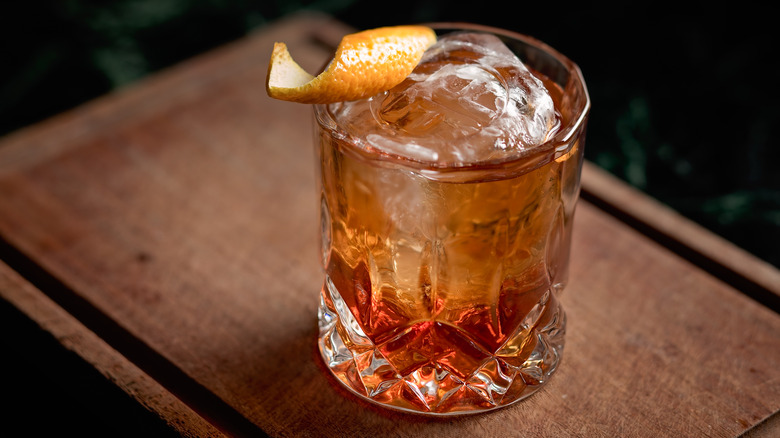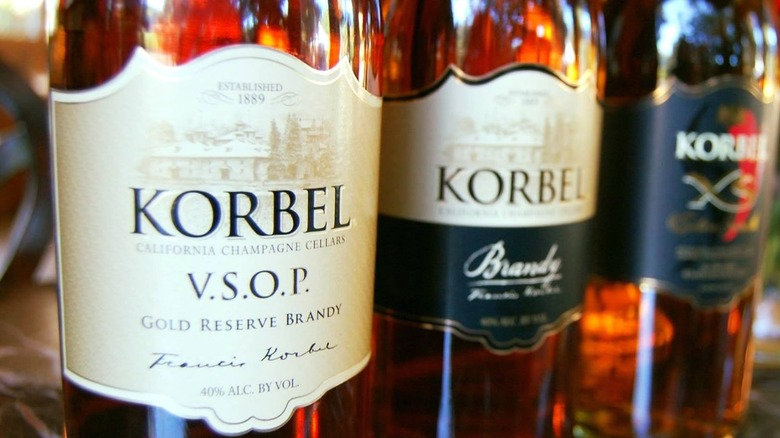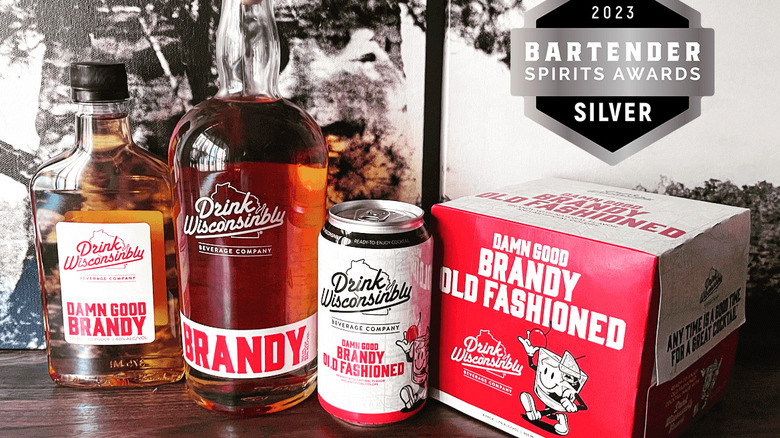Why The Brandy Old Fashioned Is Still A Hot Button Issue
The old fashioned has its name for a reason. This is a cocktail that has been around for centuries and has weathered countless bar fads and fashions. When it originated in the early 19th century, the cocktail contained bourbon, sugar, bitters, and water, and was garnished with an orange peel. Two hundred and some years later, those are still the established ingredients. Even the measurements are virtually the same. Why mess with perfection?
It's an interesting question because where cocktails are concerned, new variations are the rule, not the exception. In other words, somebody always messes with perfection. For instance, variations on the old fashioned were already popping up in the 19th century. The first cocktail guide ever published in America, in 1862 ("The Bar-Tender's Guide, and Bon-vivant's Companion — A Complete Cyclopaedia of Plain and Fancy Drinks" by Professor Jerry Thomas), notably contained a recipe for a gin-based old fashioned.
Using alternative liquors in the old fashioned has been common ever since and wouldn't be a big deal — to each their own, after all — if it weren't for the fact that a certain U.S. state is trying to formally exalt one of these substitution recipes. That state is Wisconsin, and for historical reasons, its residents prefer to drink their old fashioned cocktails with brandy, not bourbon. As the Associated Press (AP) reported, two state representatives recently introduced a controversial resolution in the Wisconsin State Assembly to give this old fashioned variation status as the state's official cocktail.
Why Wisconsin residents prefer the brandy old fashioned
People in Wisconsin drink a lot of brandy, at least in comparison with other U.S. states, with the regional passion stimulated as a result of post-World War II wood and grain rationing, which for several years caused a noticeable dip in the quality of the available whiskey. Rather than drink what they considered subpar bourbon, a group of Wisconsin liquor distributors invested in an enormous cache of Christian Brothers brandy — 30,000 barrels, to be exact — and soon, brandy old fashioneds were the favored cocktail in Wisconsin supper clubs of the period.
As Jeanette Hurt, a cocktail historian explained to The Washington Post: "If you were going to order an old-fashioned, you could get it made with either questionable whiskey or good brandy. We're not stupid — we chose brandy! And that's how we started drinking brandy, and then our kids started drinking brandy, and then our grandkids, and suddenly everybody's drinking brandy."
Of course, even Wisconsinites admit the brandy old fashioned isn't necessarily the best version of the iconic cocktail. Consider, for instance, Wisconsin's take on the traditional cocktail, which is often spritzed up with non-traditional ingredients like Sprite and sour mix, per the AP. Yes, orange is still commonly used as a garnish, but so too are items as diverse and unusual as cheese curds, pickled mushrooms, olives, and hard-boiled eggs.
Giving the brandy old fashioned official status is controversial
Kentuckians, who make the overwhelming majority of bourbon, may understandably take issue with the promotion of brandy as a suitable old fashioned substitute, and cocktail aficionados will recoil in horror at the thought of adding cheese curds or hard-boiled eggs to one of our country's most historical cocktails. So yes, the idea of elevating this regional tipple to an exalted status by making it Wisconsin's official state cocktail is indeed controversial, especially given the fact that no other state has one. Only two, in fact – Alabama and Virginia – have named a state spirit (both chose whiskey), per the AP.
The resolution isn't controversial in Wisconsin, however. Not only did it receive bipartisan support in the State Assembly, it has already passed. But this resolution doesn't carry the same weight as a bill. Meaning, it doesn't officially place the brandy old fashioned on the same footing as milk, Wisconsin's official beverage, or kringle, the state's bizarrely pretzel-like but beloved official pastry. For that, public hearings and gubernatorial approval will be necessary, and it remains to be seen whether Wisconsin representatives want to take this hot-button issue to the next level.



